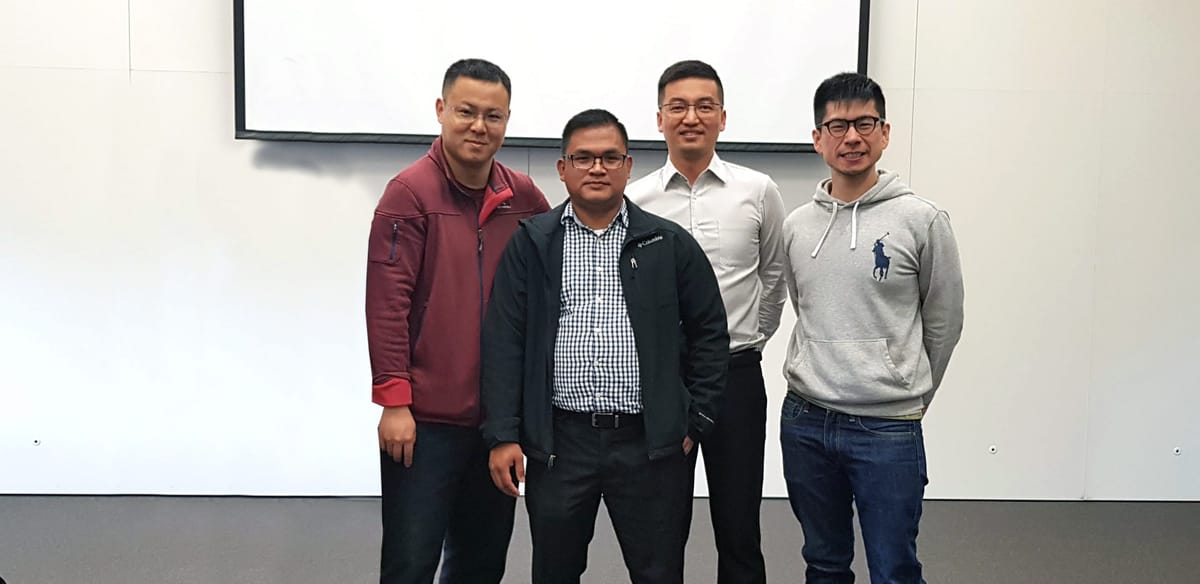Three Southern Institute of Technology (SIT) international students have just completed a collaboration project for the Invercargill City Council.
The Graduate Diploma in Engineering students, under the tutelage of Carlo Gabriel, put forward a proposal for the Isabella St Wastewater and Storm Water upgrades, and the Yarrow/Isabella Street Intersection Roundabout Construction, as part of their BENG 710 paper.
The paper required students to complete an engineering project of their choice.
Carlo contacted the Invercargill City Council Engineering Services Manager, Jeremy Rees, to see if there were any suitable projects his students could help with.
“After a meeting with him, they (the ICC) proposed working around Yarrow Street and Isabella Street, Invercargill,” said Carlo.
“After doing site investigations and research in the area, we proposed to I.C.C to work on Wastewater, Stormwater and Roundabout Construction projects.”
Project plans were developed, and performances assessed for each proposal. They included health risk management requirements, advantages, life cycles and cost-benefit analysis for each.
Hailing from the People’s Republic of China, the students, Michael Zhou, Curry Lin and Paul Siu, all worked on the projects together, with the guidance of Carlo and in collaboration with the city council.
After completing the project, Michael said he was especially grateful to Carlo for the opportunity and appreciates and enjoys his unique teaching style.
“He combines practical work with theoretical teaching, which makes our study very effective.
“With his help, we obtained the proposed project of the Invercargill City Council as our research topic. And with his encouragement, I used the same topic to participate in the SIT 3MT and won,” Michael said
The ‘Three minute thesis’ competition centred around the I.C.C’s 2018-2028 Long Term Plan to upgrade aging wastewater pipelines of Isabella Street in Invercargill.
Fellow student Paul Siu said their system design required an in-depth understanding of the current system, analysis of the current facilities and the patterns of climate change.
‘’Collecting this information has deepened my understanding of the city I am living in,” he said.
“Since my previous education and working background are related to construction management, this project allowed me to apply my previous experience to the engineering project.”
He learnt to write a formal engineering report, which he believed would be very important for his future career, allowing him to communicate with different departments and company management.
“Since this was an actual engineering project, it needs to comply with different legal requirements and standards in the design and implementation of the project,” Paul said.
“This project enabled me to apply what I have learned, such as project management, risk management, sustainable practice, construction law and professional practice.”
He said the complete project was very challenging and required a lot of data and information collection.
“When the work of other subjects needs to be considered at the same time, time control becomes very important.”
The third student involved in the collaborative project, Curry Lin said he enjoyed working on what was, a practical problem.
“I gained a lot of practical knowledge through this project, such as pre-design procedures, precautions in design and implementation, and communication skills.
He said there was a lot of preparation to be completed, before the design work could be started.
“Before the design, there were many options, such as setting traffic lights at intersections or roundabouts, or changing lanes.”
As most municipal drainage systems in Invercargill were built in the 1930’s, the systems are nearly reaching their service life.
The improvement of the ageing pipe network is essential due to the continuously increasing population of Invercargill and urban development, and it is also beneficial for residents who will face challenges of climate change in the future.
The project was conducted in two aspects, to develop a performance assessment approach for the existing pipe network and to implement the renewal process of the sewer mains. The results of the project ensure that the wastewater pipeline on Isabella Street will provide the community with satisfactory sewer services for the next 100 years.

